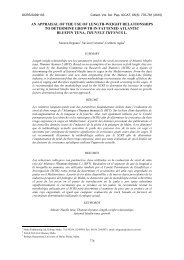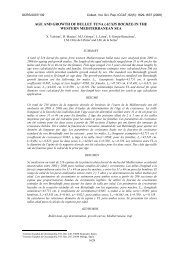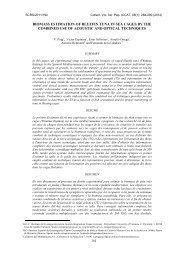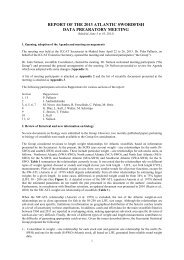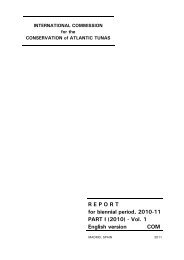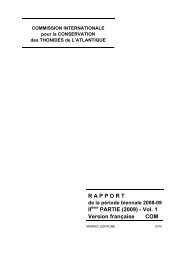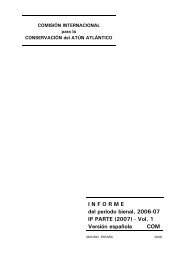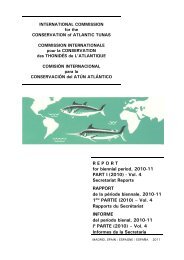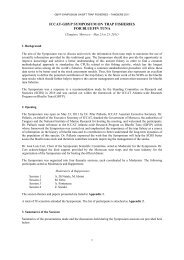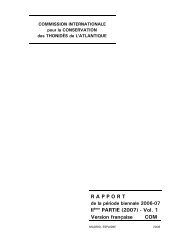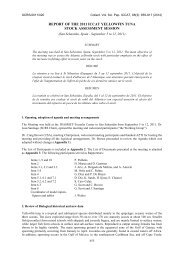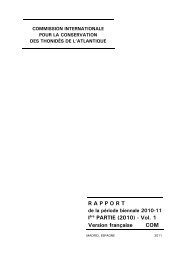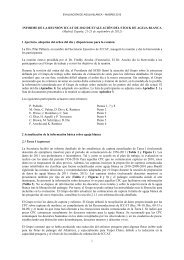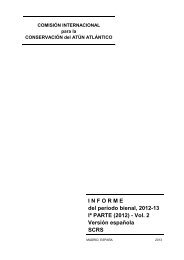E - Iccat
E - Iccat
E - Iccat
You also want an ePaper? Increase the reach of your titles
YUMPU automatically turns print PDFs into web optimized ePapers that Google loves.
ICCAT REPORT 2002-2003 (II)<br />
elsewhere. The overall catch for all fleets was about 23,000 t lower than in the early 1990s. The Committee<br />
recommended further study of the effects of the moratorium on fishing with Fish Aggregating Devices (FADs)<br />
in the Gulf of Guinea.<br />
In response to a question from the Delegate of Canada, the SCRS Chairman explained that whereas traditional<br />
models have been used for this assessment, new models are being developed in conjunction with the BETYP,<br />
and that some models used by other commissions may be considered by ICCAT.<br />
5.3 Skipjack tuna<br />
No Skipjack tuna stock assessment was conducted in 2003; the most recent assessment was conducted in 1999.<br />
The Chairman of the SCRS provided an update on the fishery for this species. He noted that catches in 2002<br />
were estimated to be 114,432 t in 2002 but this figure could be low due to unreported discards of juvenile<br />
skipjack. Catches decreased by approximately 21% for the East Atlantic and 32% in the West Atlantic with<br />
respect to corresponding 2001 values. There appeared to be a decrease in vessel carrying capacity whereas the<br />
numbers of baitboats remained stable. Moratoria to protect juvenile bigeye appear to have had an effect on<br />
skipjack.<br />
In response to a query from the Delegate of Russia, the SCRS Chairman indicated that a 2004 assessment for this<br />
species has been proposed by the SCRS, if the Commission so requests. The Commission later requested in<br />
Plenary that a skipjack assessment not be conducted in 2004, so that a bigeye assessment can be conducted.<br />
In response to a question posed by Canada, the SCRS Chairman indicated that there are problems with the<br />
skipjack data.<br />
5.4 Questions to the SCRS Chairman and interventions from the Delegates<br />
In response to the Delegate of Russia on reasons for the increase in yellowfin catches from 2000 to 2001, the<br />
SCRS Chairman indicated that either improved statistics or natural causes could be the reason. He further noted<br />
that 2002 also had high yellowfin catches, based on preliminary reports.<br />
In response to the Delegate of Japan about whether there is overcapacity in other oceans, the SCRS Chairman<br />
stated this is highly variable. The SCRS Chairman explained that while the number of vessels may decrease,<br />
catch efficiency has also likely increased due to technological advances. Japan stated that it has submitted a<br />
report on IUU for review by the PWG, that whereas fishing effort by large longliners is decreasing, fishing effort<br />
by small vessels is increasing and that they are unable to track shipments of fresh fish from these smaller vessels<br />
that are shipped to the United States.<br />
In response to a request from the Delegate of the European Community concerning statistics on Ghanaian<br />
fisheries, the SCRS Chairman noted there was a three-month pilot study, including visits to landing sites and<br />
canneries, as well as an intensive sampling program. Some problems were experienced but there will be more<br />
discussions with Ghanaian scientists and the study will continue. A report has been submitted to the SCRS<br />
(SCRS/2003/088).<br />
The Delegate of the European Community noted that whereas their fleet has been reduced, there has been an<br />
increase in the Ghanaian and other fleets. They expressed concern about the construction of vessels measuring<br />
23.9 length overall (LOA) which would be exempted from existing controls. In response to a question about<br />
sampling results from these vessels, the SCRS Chairman stated that sampling data are poor or in some cases nonexistent.<br />
Increases in observer coverage or the collection of samples by crewmembers would be the best means<br />
to address this problem as opposed to port sampling.<br />
In response to the European Community, the SCRS Chairman stated that data and sampling problems had a<br />
serious impact on bigeye assessments. This required assumptions and data substitution in the assessment process.<br />
In response to the Delegate of the United States, the SCRS Chairman stated that there are no missing recreational<br />
fishery data for the Mediterranean Sea as tropical tunas do not enter that body of water.<br />
The Delegate of Japan brought to the Panel’s attention that its large vessel longline fleet has decreased over the<br />
past 20 to 30 years, that they have increased observer coverage and that they submit sampling data. The SCRS<br />
Chairman confirmed that these are the data used for the aforementioned substitutions.<br />
178



